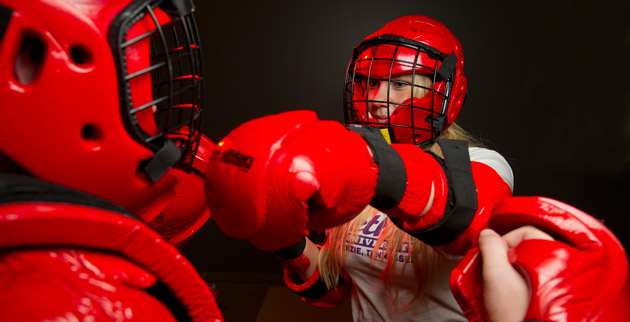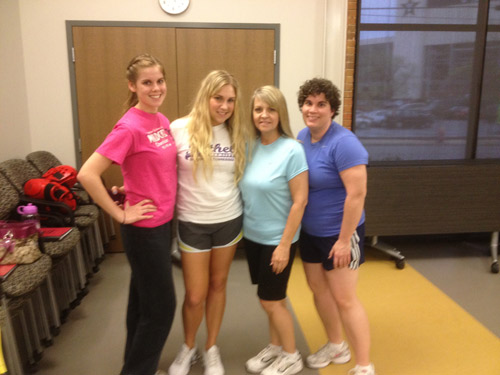VUPD’s self-defense class empowers women to protect themselves

“Block! Snap-kick! Strike! Ready!” The commands are shouted and the moves are executed with swift precision.
This isn’t a room full of black belts – it’s the training annex of the Vanderbilt University Police Department. The participants are women of all ages, shapes and sizes. The instructors of the monthly self-defense program held in this room teach women to be proactive about their safety.
The program, called the Rape Aggression Defense Systems of Self-Defense, or R.A.D., was developed in 1989. Vanderbilt has been teaching R.A.D. classes since 1998.
According to the Rape, Abuse and Incest National Network, someone in the United States is sexually assaulted every two minutes. A 2007 study by the Department of Justice found that 18 percent of women in the United States have been raped in their lifetime. This number is even higher on college campuses.
Statistics like these are sobering, and it can be easy for women to feel overwhelmed or discouraged. “You hear all the stories, and I don’t want to be a victim,” said Tori Cole, a junior at Donelson Christian Academy. “[rquote]I want to be able to feel confident when I’m out by myself.”[/rquote]
Cole took the class with her mother, Lesa Cole, a nursing professional development specialist at Vanderbilt. The Coles signed up for the class as part of a school project that required Tori to try something different.
“It makes me feel better to know that she’s got more confidence,” Lesa Cole said. Her daughter agreed, stating that she hoped she could take the class again before she goes to college.
R.A.D. is successful because it gives women confidence through self-defense techniques that anyone is capable of using once learned. “Anybody can do this class,” said Lt. Rochelle Waddell, who runs the R.A.D. program at Vanderbilt. “It’s basic. We take our time, and if you’re having some difficulties, we can modify it to work for you.”
A R.A.D. class at Vanderbilt involves 12 hours of instruction divided into three four-hour classes and completed over three consecutive weeks. The instructors are usually VUPD officers. “We’re very careful about who we choose,” Waddell said. Instructors must be careful to pay individual attention to participants and check that each has mastered a technique before moving on to the next.

The first class includes information about ways that women can make their surroundings safer. Those strategies have already made a difference for Tori Cole. “I was at a gas station and a guy came up and wanted me to roll down my window, and I didn’t because I thought about this class.”
Once the lecture portion is finished, the class is mostly physical. “It’s a gradual progression and I learned something each time,” said Tiffany Madish, a registered nurse with Vanderbilt’s Home Healthcare Division. The instructors lay a foundation, then begin to teach skills that build on it. Eventually the movements become second nature, and students are surprised by what they can do.
Participants learn how to cope in a variety of real-life situations during the second class. These situations range from an unwanted advance at a bar to an actual attack from a stranger. “I feel stronger as a person,” Madish said. “[rquote]I didn’t know the strength I had. The knowledge I have now is powerful.”[/rquote]
One of the most important parts of the class is empowering women to be loud and vocal when defending themselves. Each movement is paired with an emphatic “No!” from all participants, and instructors are quick to encourage students to be louder. This vocal participation can be intimidating for some women, said Waddell, but anyone is welcome to call and talk with an instructor in advance to address her concerns.

During the final class, participants practice their new skills faced with “aggressors” who mimic real-life scenarios. In order to keep it realistic, no one knows what to expect in advance. The interactions are videotaped so that students can see how they responded to their “attacker” and which techniques they used.
“There were things we were taught that I didn’t think would actually work, but when you were on the ground and had someone bigger than you holding you down, they worked,” Lesa Cole said.
The cost of the R.A.D. program is $20 for Vanderbilt faculty, staff and students. Once a student has successfully completed the program, they are welcome to retake the class at any time, free of charge. “You can come back as long as we have a class scheduled or just to practice during the simulations,” Waddell said.
“No matter what age you are, it’s valuable to feel like you can defend yourself in those situations,” said Lesa Cole. “Every woman should do something like this.”
For more information, visit VUPD’s RAD website.
Contact: Jenny Mandeville, (615) 322-news
jenny.mandeville@vanderbilt.edu